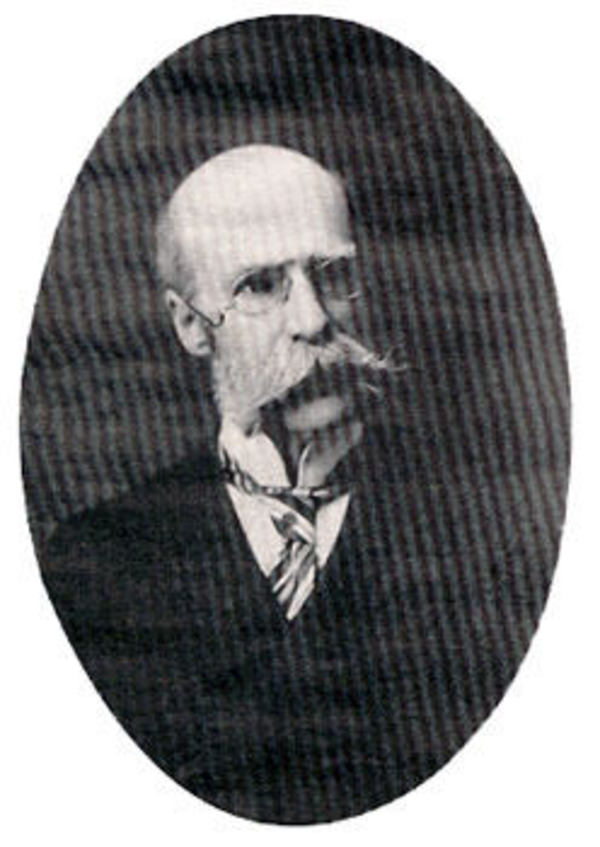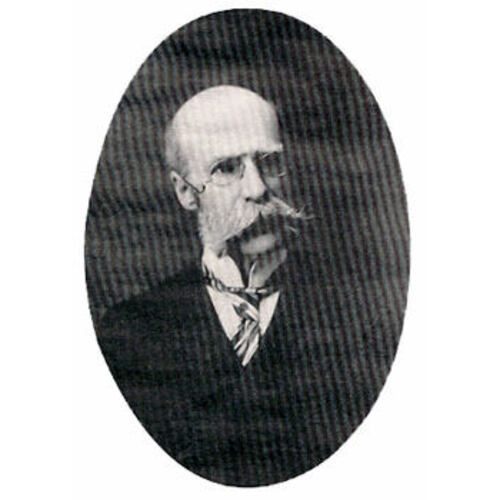
Source: Link
HATHEWAY, WARREN FRANKLIN, businessman, social activist, politician, and author; b. 16 Sept. 1850 in Saint John, son of Thomas Gilbert Hatheway and Harriet E. Bates; m. first 28 Feb. 1880 Elizabeth Elsom Green in Dedham, Mass.; m. secondly 19 Feb. 1883 Ella Bertha Marven in Saint John, and they had two daughters; d. there 29 Oct. 1923.
The family of W. Frank Hatheway was well-connected in the social, commercial, and political circles of New Brunswick. His paternal great-grandfather had commanded loyalist troops in the American revolution, and his grandfather Calvin Luther Hatheway* wrote a history of the province published in 1846. A cousin, George Luther Hatheway*, served as premier during 1871–72. The death of Hatheway’s father in 1855 and his brother Charles E. in 1863 had stripped the family of its gentility, however. “We suddenly realized that we were quite poor . . . and [I] at once determined to go to work,” he recalled. At 13 he left school and found employment as a clerk in the office of the Union Line steamers, managed in part by his brother Thomas, and from 1868 with the wholesale provisions firm of William Wallace Turnbull*, a relative by marriage, where he rose to become bookkeeper. These early experiences gave Hatheway an appreciation for the lot of the labouring classes as well as the skills needed to establish his own grocery business.
Hatheway embarked on a vigorous program of intellectual improvement during his time with Turnbull, studying the classical Latin authors to improve his speaking style, and learning French, Spanish, and German. He began to write for the press, too, submitting translations of Chateaubriand to the Saint John periodical Stewart’s Literary Quarterly Magazine [see George Stewart*]. Verse under the pseudonyms Carey and Philip and articles signed O. M. also began appearing in the Saint John Globe. Together with some other young men he formed the Round Table Club, a forerunner of the Fortnightly Club, to discuss literary topics. Hatheway also learned guitar during this period and sang at Germain Street Baptist Church, though he was a lifelong member of St John’s (Stone) Anglican Church. These activities were complemented by membership in the 62nd (Saint John) Battalion of Infantry, in which he attained the rank of captain in 1872.
The fire that devastated the city in June 1877 marked the turning-point in Hatheway’s career. He left Turnbull before the end of the year and established his own grocery firm on 1 Jan. 1878 with James Spurr Harding. It flourished, carrying sugar, flour, fish, and a variety of teas (the firm was one of the first in Canada to import tea directly from China). When the partnership was dissolved in 1887, the business was worth over $20,000. Hatheway continued on his own and by 1895 employed four salespeople to travel about the Maritimes. From 1887 he enabled his employees to share in the profits of his company, and when he made it a limited liability firm in 1908 he allowed several of them to become part-owners.
Hatheway’s political sensibilities also awakened after 1877. “The new Canada appealed to my imagination,” he stated, and moved perhaps as much by personal respect for his friend Samuel Leonard Tilley* as by national and economic reasons, he embraced the protectionist policy of Sir John A. Macdonald*’s Conservative government as a means to improve the welfare of workers. Though he would remain essentially a Conservative, he did not let party affiliation stand in the way of personal beliefs. The support given by Sir Charles Tupper*’s administration to Halifax over Saint John as the terminus of a recently inaugurated fast Atlantic mail service prompted Hatheway to break with the Conservatives in 1896. In the years before he returned to the Conservative fold in 1901 he discovered the freedom to advocate his socialist ideas.
The pamphlet Poorhouse and palace (1900), for example, advocated a system of graduated taxation exempting those earning less than $800 a year (Hatheway subsequently reduced the amount to $600 and then $400 in order to gain his point). He further demonstrated his socialist tendencies by spearheading the formation of the Fabian League in Saint John in April 1901. The organization encouraged the discussion of economic problems, especially issues concerning the working population. It was not a political body, but a card published later that year outlines a platform consistent with Hatheway’s political agenda. The Fabians sought public ownership of utilities and services, as well as of natural resources that could be monopolized by private interests. The league also established a board of arbitration to negotiate between employees and employers. Hatheway would continue to support Fabian aims as an mla after 1908.
Hatheway’s increasing political activity had led him to run in the provincial election of 1903 as a labour candidate for Saint John City. Unsuccessful, he “saw political expedience in playing the game more conventionally,” according to G. H. Allaby, and in 1908 he stood as an official opposition (Conservative) candidate with labour backing, a strategy that took him to Fredericton. There he fought, largely without success, for a number of radical causes. Despite stiff opposition from members of his own party, now in power under John Douglas Hazen*, he was able to amend William Pugsley’s Workmen’s Compensation for Injuries Act of 1903 to secure the principle that employers were responsible for injuries incurred through the negligence or incompetence of fellow workers. The points he conceded to achieve this result cost him support among unionists and reformers until 1910 when he successfully pressed for a government bureau to monitor labour conditions throughout the province. Two years later he was instrumental in the passage of government amendments that brought the workmen’s compensation legislation up to the standard he had campaigned for in 1908. These successes eclipse the failure of equally significant causes such as the enfranchisement of widows and unmarried women owning property or having an annual income of at least $400. His wife Ella, a suffragist and a founding member of the Women’s Enfranchisement Association in Saint John [see Emma Sophia Skinner*], encouraged him in the latter campaign. The two also worked to establish the first kindergarten in Saint John.
Hatheway was ultimately overtaken by the acceptance among reform-minded elements of the population of his own radical ideas, a process evident by 1910. Following his decision not to run in the 1912 election – possibly because the government of James Kidd Flemming had denied him the office of first commissioner of labour – he continued to write on a variety of subjects that encouraged readers to know themselves and the world about them. He sought an economic, political, and social order that would make Canada strong. Though his books were rarely acknowledged in New Brunswick, they attracted some critical acclaim nationally. A deed of 83 acres of land to the labourers of Saint John in 1917 was a practical expression of the love of nature and commitment to workers evinced in his writing. Hatheway died of a stroke six years later.
Warren Franklin Hatheway’s publications include a poetry chapbook published under the pseudonym R. Belmont as God and the doubter; At Partridge Island; Sunset on Nerepis River; and other verses ([Saint John, 1896]), as well as several pamphlets and books issued under his own name: Canadian nationality; The cry of labor; and other essays (Toronto, 1906); The reciprocity agreement: its effect on New Brunswick ([Saint John], 1911); Injustice to New Brunswick: a few facts for thoughtful, impartial, liberal Liberals (n.p., [c. 1908]; copy in the New Brunswick Museum, Saint John); Mr. W. Frank Hatheway’s speech in support of the more complete education for the mechanic and farmer, given in the House of Assembly, Fredericton, N.B., March 19th, 1912 ([n.p., 1912]); Why France lost Canada, and other essays and poems (Toronto, 1915); Trade after the war: a resume of trade conditions in France, Italy and Great Britain before 1915, with suggestions as to expansion of Canada’s trade after the war ([Saint John, 1917]); and Labor’s just and reasonable demands: . . . should not these demands be granted? A review of what Australia and other countries have done, and what Canada must do (Saint John, 1919). A selection of his writings edited by James Keith Chapman has been published under the title Hair from a black stallion’s tail (Fredericton, 1986), and reissued, without the frontispiece photograph of Hatheway, as Frank Hatheway’s highways & byways: tales from 19th century wanderings in New Brunswick, the Gaspe, and Cape Breton (Fredericton, 1986). Hatheway also contributed articles to several periodicals, including Atlantic Monthly (Boston), Canadian Magazine (Toronto), Contemporary Rev. (London and New York), Empire Rev. (London), and New England Magazine (Boston).
Manuscript and archival material relating to Hatheway includes a typescript autobiography at the Univ. of N.B. Library, Arch. and Special Coll. Dept., Fredericton, as well as a file of documents regarding his militia involvement and some biographical material at the New Brunswick Museum (Hatheway, W. F., cb doc). Hatheway’s marriage to Elizabeth Elsom Green is recorded in the International geneal. index of the Church of Jesus Christ of Latter-day Saints, Geneal. Soc. (Salt Lake City, Utah), but no further reference to her has been found.
An excellent obituary and editorial comment appeared in the Saint John Globe, 30 Oct. 1923: 2, 4. The other main biographical sources are Hatheway’s entry in Canadian men and women of the time (Morgan; 1912) and Chapman’s sketch in Hair from a black stallion’s tail, pp.41—50. A critical consideration of Hatheway’s work appears in G. H. Allaby, “New Brunswick prophets of radicalism, 1890–1914” (ma thesis, Univ. of N.B., 1972), pp.86—123.
Cite This Article
Peter J. Mitham, “HATHEWAY, WARREN FRANKLIN,” in Dictionary of Canadian Biography, vol. 15, University of Toronto/Université Laval, 2003–, accessed February 20, 2026, https://www.biographi.ca/en/bio/hatheway_warren_franklin_15E.html.
The citation above shows the format for footnotes and endnotes according to the Chicago manual of style (16th edition). Information to be used in other citation formats:
| Permalink: | https://www.biographi.ca/en/bio/hatheway_warren_franklin_15E.html |
| Author of Article: | Peter J. Mitham |
| Title of Article: | HATHEWAY, WARREN FRANKLIN |
| Publication Name: | Dictionary of Canadian Biography, vol. 15 |
| Publisher: | University of Toronto/Université Laval |
| Year of publication: | 2005 |
| Year of revision: | 2005 |
| Access Date: | February 20, 2026 |



